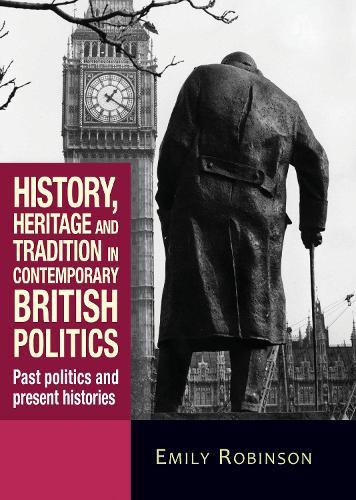Overview
History, heritage and tradition in contemporary British politics explores the use of the past in modern British politics. It examines party political perspectives on British history and the historical process and also looks at the ways in which memory is instituted within the parties in practice, through archives, written histories and commemorations. It focuses in particular on a number of explicit negotiations over historical narratives: the creation of the National Curriculum for History, Conservative attempts to re-assess their historical role in 1997, the assertion of a 'lost' social democratic tradition by the SDP and New Labour and the collapse of the Communist Party of Great Britain's narrative memory in 1988-91. This book shows how history, heritage and tradition are used to present parliamentary politics as intrinsically 'historic' and suggests that the disappearance of active political pasts leaves contemporary politicians unable to speak of radically different futures. -- .
Full Product Details
Author: Emily Robinson
Publisher: Manchester University Press
Imprint: Manchester University Press
Dimensions:
Width: 15.60cm
, Height: 1.20cm
, Length: 23.40cm
Weight: 0.322kg
ISBN: 9781784993849
ISBN 10: 1784993840
Pages: 224
Publication Date: 05 April 2016
Audience:
College/higher education
,
Professional and scholarly
,
General/trade
,
Tertiary & Higher Education
,
Professional & Vocational
Format: Paperback
Publisher's Status: Active
Availability: Manufactured on demand

We will order this item for you from a manufactured on demand supplier.
Reviews
Although it is quite wide-ranging in terms of source material, the focus of this interesting, readable, and thought-provoking book is most concerned with the historically inflected rhetoric by senior members of political parties than on the historical political imagination per se. The focus is frequently on the aesthetic and emotional ends that the rhetoric is put to-with the book drawing on various literary writings for approaches and to appropriate critical distinctions. Particularly good are arguments about the importance of the decline-across the board-of political pessimism, and its replacement by a deadening optimism that is both born of an extremely limited world view but which nevertheless projects an unlimited vista forwards., SCOTT ANTHONY, University of Cambridge, Twentieth Century British History, 5 September 2013| this is a fascinating and thought-provoking book, which is well worth reading. (Political Studies Review Volume 12, Issue 3, September 2014), Simon Griffiths, Goldsmiths, University of London, Political Studies Review Volume 12, Issue 3,, 1 September 2014 -- .
Although it is quite wide-ranging in terms of source material, the focus of this interesting, readable, and thought-provoking book is most concerned with the historically inflected rhetoric by senior members of political parties than on the historical political imagination per se. The focus is frequently on the aesthetic and emotional ends that the rhetoric is put to-with the book drawing on various literary writings for approaches and to appropriate critical distinctions. Particularly good are arguments about the importance of the decline-across the board-of political pessimism, and its replacement by a deadening optimism that is both born of an extremely limited world view but which nevertheless projects an unlimited vista forwards., SCOTT ANTHONY, University of Cambridge, Twentieth Century British History, 5 September 2013| this is a fascinating and thought-provoking book, which is well worth reading. (Political Studies Review Volume 12, Issue 3, September 2014), Simon Griffiths, Goldsmiths, University of London, Political Studies Review Volume 12, Issue 3,, 1 September 2014 -- .
Although it is quite wide-ranging in terms of source material, the focus of this interesting, readable, and thought-provoking book is most concerned with the historically inflected rhetoric by senior members of political parties than on the historical political imagination per se. The focus is frequently on the aesthetic and emotional ends that the rhetoric is put to-with the book drawing on various literary writings for approaches and to appropriate critical distinctions. Particularly good are arguments about the importance of the decline-across the board-of political pessimism, and its replacement by a deadening optimism that is both born of an extremely limited world view but which nevertheless projects an unlimited vista forwards. -- SCOTT ANTHONY. Twentieth Century British History this is a fascinating and thought-provoking book, which is well worth reading. (Political Studies Review Volume 12, Issue 3, September 2014) -- Simon Griffiths. Political Studies Review Volume 12, Issue 3,
Although it is quite wide-ranging in terms of source material, the focus of this interesting, readable, and thought-provoking book is most concerned with the historically inflected rhetoric by senior members of political parties than on the historical political imagination per se. The focus is frequently on the aesthetic and emotional ends that the rhetoric is put to—with the book drawing on various literary writings for approaches and to appropriate critical distinctions. Particularly good are arguments about the importance of the decline—across the board—of political pessimism, and its replacement by a deadening optimism that is both born of an extremely limited world view but which nevertheless projects an unlimited vista forwards., SCOTT ANTHONY, University of Cambridge, Twentieth Century British History, 5 September 2013|""this is a fascinating and thought-provoking book, which is well worth reading."" (Political Studies Review Volume 12, Issue 3, September 2014), Simon Griffiths, Goldsmiths, University of London, Political Studies Review Volume 12, Issue 3,, 1 September 2014 -- .
Author Information
Emily Robinson is an Advance Research Fellow in the School of Politics and International Relations at the University of Nottingham.




